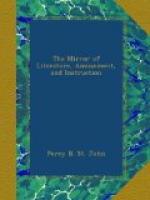“The distinctions between the first and second part of the Pilgrim’s Progress are such as circumstances render appropriate; and as John Bunyan’s strong mother wit enabled him to seize upon correctly. Christian, for example, a man, and a bold one, is represented as enduring his fatigues, trials, and combats, by his own stout courage, under the blessing of heaven: but to express that species of inspired heroism by which women are supported in the path of duty, notwithstanding the natural feebleness and timidity of their nature, Christiana and Mercy obtain from the interpreter their guide, called Great-heart, by whose strength and valour their lack of both is supplied, and the dangers and distresses of the way repelled and overcome.
“The author hints, at the end of the second part, as if ’it might be his lot to go this way again;’ nor was his mind that light species of soil which could be exhausted by two crops. But he left to another and very inferior hand the task of composing a third part, containing the adventures of one Tender Conscience, far unworthy to be bound up, as it sometimes is, with John Bunyan’s matchless parable.”
* * * * *
’Tis necessary a writing critic should understand how to write. And though every writer is not bound to show himself in the capacity of critic, every writing critic is bound to show himself capable of being a writer.
Shaftesbury Criticism
* * * * *
NOTES OF A READER.
LACONICS.
(From Maxwell. By Theodore Hook.)
Professional People.
None of our fellow-creatures enjoy life more than the successful member of one of the learned professions. There is, it is true, constant toil; but there are constant excitement, activity, and enthusiasm; at least, where there is not enthusiasm in a profession, success will never come—and as to the affairs of the world in general, the divine, the lawyer, and the medical man, are more conversant and mixed up with them, than any other human beings—cabinet ministers themselves, not excepted.
The divine, by the sacred nature of his calling, and the higher character of his duties, is, perhaps, farther removed from an immediate contact with society; his labours are of a more exalted order, and the results of those labours not open to ordinary observation; but the lawyer in full practice knows the designs and devices of half our acquaintance; it is true, professional decorum seals his lips, but he has them all before him in his “mind’s eye,”—all their litigations and littlenesses,—all their cuttings, and carvings, and contrivings. He knows why a family, who hate the French with all the fervour of British prejudice, visits Paris, and remains there for a year or two; he can give a good reason why a man who delights in a well preserved property in a sporting country, with a house well built and beautifully situated, consents to “spare it,” at a reduced price, to a man for whom he cares nothing upon earth: and looks at the world fully alive to the motives, and perfectly aware of the circumstances, of three-fourths of the unconscious actors by whom he is surrounded.




